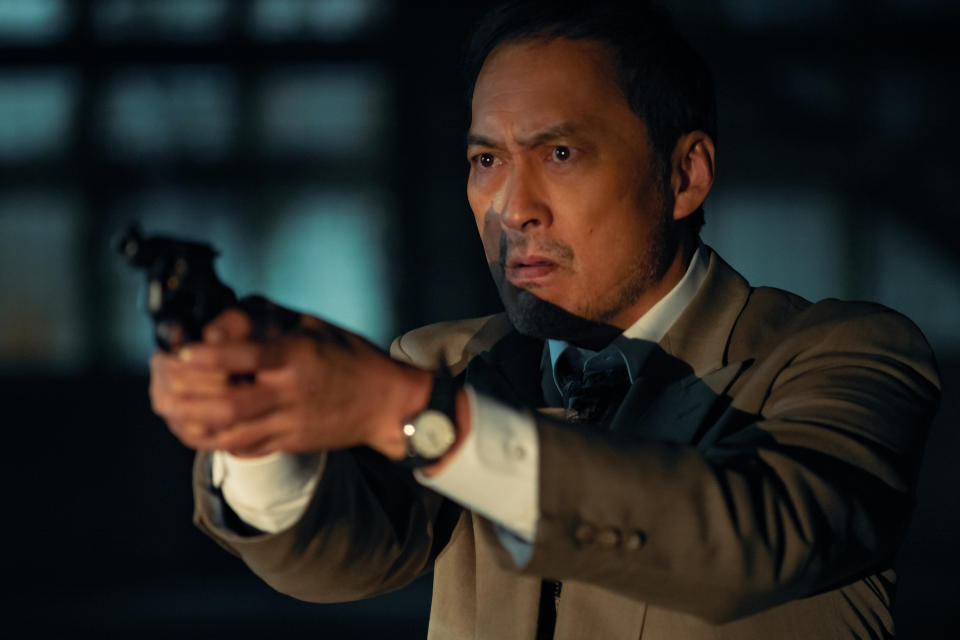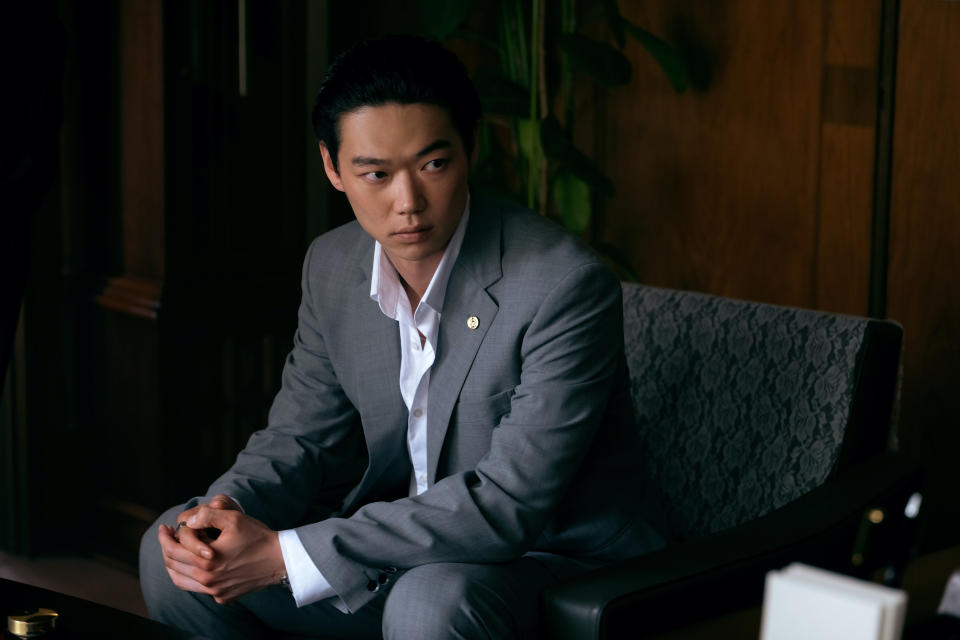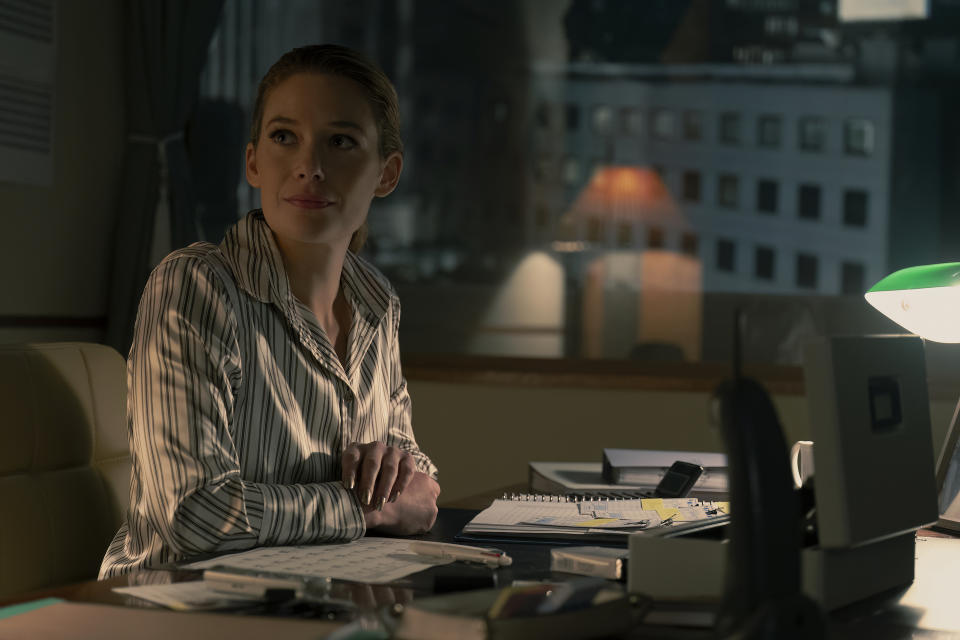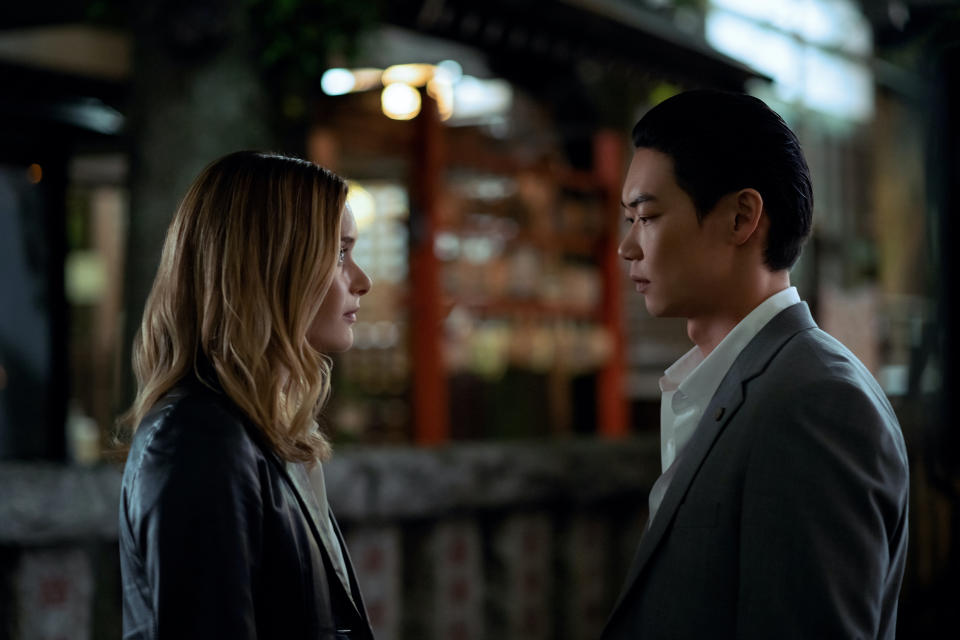Tokyo Vice Season 2 Premiere: Ansel Elgort on Jake's Sex With Misaki
- Oops!Something went wrong.Please try again later.
- Oops!Something went wrong.Please try again later.
- Oops!Something went wrong.Please try again later.
- Oops!Something went wrong.Please try again later.
- Oops!Something went wrong.Please try again later.

SPOILER ALERT: This interview contains spoilers from the Season 2 premiere of HBO’s “Tokyo Vice,” now streaming on Max.
“Jake is being a very bad boy…”
More from Variety
That’s how Ken Watanabe, who plays detective Hiroto Katagiri, described Jake Adelstein’s (Ansel Elgort) actions at the end of “Tokyo Vice’s” Season 2 premiere. The second season picks off right where Season 1 ended in April 2022 and plugs viewers back into the neon-lit streets of Tokyo’s underbelly.
Loosely based on the memoir written by journalist Jake Adelstein, “Tokyo Vice: An American Reporter on the Police Beat in Japan,” the show follows Adelstein as he works with detective Katagiri to expose the atrocities committed by the yakuza and dismantle organized crime in the city.
The jaw-dropping Season 2 premiere, which debuted on Max with two episodes, saw Jake, the Japan-based journalist, for lack of a better phrase, “sealing the deal” with Shinzo Tozawa’s (Ayumi Tanida) girlfriend, Misaki (Ayumi Ito) — potentially threatening Jake’s own life if the yakuza clan leader were to learn about his promiscuous rendezvous.
For his part, Elgort was a bit more forgiving and sympathetic of Jake’s decision, attributing it to loneliness and a desire to connect with someone following the fallout of his relationship with Samantha Porter, played by Rachel Keller. However, he doesn’t justify Jake’s actions outright, as Elgort said he thinks his character is being very “reckless.”
“She entices him; she’s this mysterious woman, who he honestly feels bad for,” Elgort said. “It’s dangerous for both of them to be getting together, but Jake is obviously attracted to danger — whether he knows it or not — he’s always going to the most dangerous place he could go. He always wants to investigate the most dangerous story.”

Recklessness and desperation seem to be the running themes for “Tokyo Vice’s” Season 2, as the premiere also saw Watanabe’s Hiroto growing more and more desperate in his need to take down Tozawa and cripple the yakuza’s grip on Tokyo.
In an almost whiplashing backtrack, Hiroto, who starts Episode 1 off by outright declaring he no longer wants to persecute the yakuza — going so far as to move his family away from Tokyo out of fear that Tozawa’s clan may have them killed — ends Episode 2 by accepting an offer to join the Japanese National Police Agencies Shoko Nagata’s (Miki Maya) task force to combat organized crime in the city.
“Nagata also has a past with the yakuza; she and Hiroto share a similar goal of eradicating them. Even though he knows this will be very difficult to achieve, it’s the only thing he can do,” Watanabe said.
But this sense of anguish may cause Hiroto to lose his way. Season 1 showed the lengths he’d go to for his cause — including torturing Vice Minister Shigematsu (Hajime Inoue) for information. “He needs to keep the law,” Watanabe said. “His family was threatened, and I think he feels he has no choice but to fight back.”

With all this talk of Tozawa and how he’s influenced the lives of our protagonists, it was jarring to note his absence from the premiere. The last we saw him, he was on a flight headed to America, having left Japan and the yakuza behind, or so it seemed.
Although show creator J.T. Rogers cautiously tried not to give too much of the season away, he stressed that fans will need to pay close attention to the first two episodes, as viewers will be able to catch some of the season’s big reveals and plot twists concerning Tozawa before they come.
“I think you should watch to see what happens. The intention all along with Season 1 was to set the table, and now we’re going to eat in Season 2,” Rogers said. “There is a war coming, so people will go away and then come back in multiple ways in the show. I’ll leave things at that.”

With the criminal underworld preparing for war, the stakes continue to be raised, and with it, the violence. One character who got the knife’s end of that deal (literally) is Sato.
Played by Show Kasamatsu, Season 1’s finale saw our good-hearted (but often corroded and conflicted by the underworld’s dark influences) yakuza bleeding out on the street — betrayed by a member of his own Chihara-kai clan. Seemingly having fully recuperated from his injury in the premiere, Sato not only decides to spare his assailant’s life but, on his sick bed, actively uses his waning strength to hold back the knife his clan leader Hitoshi Ishida (Shun Sugata) is using to slice the neck of his attacker, imploring to Ishida, “No… No more…”
Recalling that violent scene from the Season 1 finale, Kasamatsu revealed that he encouraged his co-star to hit him as hard as he could with the prop knife used to film the scene so he could act out a more realistic portrayal of the injury.
“I actually asked the other actor to really poke Sato so I could feel the physical pain that he would be going through. So it was very painful,” Kasamatu said. He humorously added how he had to commit to “not moving” during those early scenes in Season 2’s first episode, where Sato was lying on his deathbed in the hospital, saying it was “challenging” for him.

Also recovering from wounds, albeit emotional ones, is Samantha, who lost her best friend, Polina, in the Season 1 finale. Having opened and established her new club, Samantha is finally stepping into the leadership and entrepreneurial role she longed for in Season 1.
When talking about her character’s arc and what we can expect Sam’s story to look like in Season 2, Keller said, “Sam has suffered an incredible loss when she learns about what happened with Polina, which I think kind of sets the fire for her for the rest of the season.”
“I think she’s got some hurt, anger and lots of protection. She has to protect what she’s built for herself and the young women around her,” Keller said.
Adding to Sam’s baggage is her history with the Mormon church — she was able to escape from the religious cult, but was then forced to fend for herself in Japan. Though a prominent aspect of her character in Season 1, the Season 2 premiere doesn’t tackle that aspect of her backstory. Presumably, the thread resolved itself once Sato killed the man blackmailing Sam, threatening to reveal to her father (the Mormons’ ring leader) her location.
When asked whether we can expect those elements of her past to engulf and dictate her arc in Season 2, Keller, while wanting to not reveal too much about the season, said we can anticipate that part of her character to be an essential aspect of the season but “not in the way we might expect.”
“I think Sam, coming from this religious cult that she grew up in, is not unfamiliar with being trapped in a birdcage,” Keller said. “We explore that theme of being trapped in a controlled environment, and there is a kind of pressure that rules over Sam’s actions out of fear of her being found out.”

With such an explosive and jam-packed premiere, Season 2 of “Tokyo Vice” looks to up the ante established in Season 1. Though there are some loose threads from Season 1 to tie up, new characters — like the heir apparent to the Chihara-kai clan Naoki Hayama (Yosuke Kubozuka) — and story beats will continue to test raise the stakes and keep viewers watching (and singing along to the Backstreet Boys).
Here, Ansel Elgost, Ken Watanabe, Show Kasamatsu, Rachel Keller and “Tokyo Vice” showrunners J. T. Rogers and Alan Poul talk to Variety about the Season 2 premiere, what fans can expect from the rest of the season and, of course, what songs viewers can expect to sing along to in Season 2.
What can fans expect from Season 2 as a whole?
J.T. Rogers (Creator, Writer, Executive Producer): Season 2 begins in Episode 2. You meet two very interesting characters that very prominent Japanese actors play for a reason. That was by design because, as you’ll see, they will have a massive effect on our lead characters moving forward.
Alan Poul (Executive Producer, Director Season 2, Episodes 1 and 2): Episode 2 is a lot of warm-up, and this is where the build begins. Without giving spoilers, we blow the lid off the joints by the time we reach the mid-season point.
Show Kasamatsu (Sato): Season 2 will be an emotional roller coaster. Between the shock of seeing Samantha for the first time and her now giving him the cold shoulder to Sato’s internal conflict, there is much to look forward to. There is a lot of regret for all the people he’s hurt and killed and what he’s done to get to where he is. As the season progresses, you’ll continue to see how Sato struggles with wanting to rise through the ranks of the yakuza while feeling bad for what he’s done to others and himself. As you’ll see, he’s made lots of enemies.

You wrote Season 2 as you were shooting Season 1. How did that affect your creative process?
Rogers: Well, it definitely affected my sleep patterns. It’s not something I would want to do again. It was just the enthusiasm from our network, and our studio wanted to make sure we could do more. So it was more of a yes, let’s do it.
How did your fluency in Japanese and knowledge about the culture aid the show’s development?
Poul: Being able to watch the show or watch the shooting through two different lenses, my native American lens and my adopted Japanese lens, I think, was really critical in terms of creating the communication channels that would allow the show to be successful in Japan, and be respected in Japan. We needed to get that respect from our Japanese colleagues and the viewing public, and I was fortunate to be able to play a key role in that.
What’s one thing you most admire about the other?
Ansel Elgort (Jake Adelstein) to Ken Watanabe (Hiroto Katagiri): I think he’s amazing. No, really. The career that Ken has had and all the great roles that he’s played are remarkable. His physicality as an actor is really exciting to watch. But then, he makes acting seem effortless when doing scenes with him. He’s able to do these great takes, maybe because he worked with Clint Eastwood, but he’s able to do everything in one take. It’s usually just the first take. He nails it right off the bat. It’s perfect. It’s effortless. And it’s like right on the money. I really respect that about him and have always loved working with Ken and watching him work.
Ken Watanabe (Hiroto Katagiri) to Ansel Elgort (Jake Adelstein): Ansel is an exceptionally hard worker. On his days off, he’s made an effort to travel a lot throughout Japan to try and learn about the customs, culture and language. After shootings, everyone will wave him goodbye, and he’ll bow and respond with “arigato.” He’s become very Japanese. He’s become a true Japanese actor.

Rogers to Poul: There is so much I would say, but if I were to narrow it down, I would say, Alan is a legend for a reason. As a director, his mastery of everything, from directing to budgets to talking to location staff to thinking of the broad picture and interpreting text properly, is remarkable. Working with him and seeing how he navigates has been tremendous for me as a first-time showrunner. But this show has a unique superpower in that Alan is educated in Japanese literature and cinema, speaks the language fluently, has made movies and has lived here on and off for decades. So he is that that’s a special sauce for bridging the two worlds of our show, the two cultures that make our show.
Poul to Rogers: For J.T., there are two things. One is the fact that he had an actual relationship with the subject matter — J.T. grew up with Jake Adelstein and, therefore, has a deeply personal connection between them at the heart of the material that really informs how the character and the world have developed. The second point is that this is, in many ways, a crime show. It’s a show about cops and tough newspapermen and gangsters and hostesses. Still, J.T. is not interested per se in the genre elements as much as he is interested in creating unforgettable characters and making them move you. Because of that, it wouldn’t necessarily make him the most automatic logical choice to adapt Jake’s memoir. Still, it’s what makes the show special and what elevates it beyond the procedural, and I can’t imagine the show without that voice.
In Season 1, you two shared a lot of scenes, as you had interwoven stories, but from what we’ve seen of Season 2, your paths won’t cross as much. Do you miss acting together?
Kasamatsu: Needless to say, not having Rachel Keller on set together feels like the Earth is missing its ocean. Of course, I miss her all the time, because I really loved being on set together with Rachel, but as you’ll soon see, something big will happen to bring everyone closer together. I’m very excited about that, and I hope the audience feels the same.
Keller: I looked forward to every day when I was with Shô. They were my favorite days. I think it was just our working friendship and relationship. I was so happy when I knew [in Season 1] we would be working together. When you said that you thought we didn’t have that many scenes together, it clicked to me that you’re right — we didn’t have that many scenes together in Season 2. But I didn’t think about it, because the scenes we had and have had were meaningful and memorable for me. So I don’t think about it that way. I just get excited when we work together.

What was it like getting to live in and experience Japan for as long as you did as an American?
Keller: Wonderful. It felt like absolute magic, learning the language and getting to know the people traveling around, and, of course, Samantha’s Japanese is much better than the foundational Japanese I was learning. It’s a beautiful language, and we had so much fun trying to achieve something with some dignity and truth to it. Because I really felt like I had a responsibility to the language and the people and this show to get it as right as I could.
Elgort: It’s interesting, because when you first come here — as an American, or as any foreigner — I think everyone has culture shock because of the culture is so and so you know, it was interesting when Shailene [Woodley, former co-star of Elgort’s “The Fault in Our Stars”] came and visited because I was able to see it from her eyes again — like oh, like how different this place is, compared to Western culture. I’m very grateful for the lessons I’ve learned here and hope to continue learning from this great culture. There’s something so amazing about being here, from its history and how humble people are and how they pay respect to everyone around them.
One of the most iconic moments from Season 1 is when you both dueted the Backstreet Boys’ “I Want It That Way.” Can we expect more song covers in Season 2?
Kasamatsu: Oh, yes, of course, you can expect some great songs in Season 2. We also got to introduce some famous Japanese songs this time, not just the Backstreet Boys.
Elgort: Yeah! Actually, this season, I was able to sing a Japanese song. I love, love music; I think that life without music would be nothing. It was interesting because although the scene was played for laughs, the song is incredibly symbolic. Basically, it was a post-WWII song written to cheer up Japanese people, and it goes something like, “Walk while you look up so that the tears don’t fall out of your eyes, and be cheerful.” Through learning that song though I was able to present it in a funny moment, I’m glad that I was able to learn that song and the story behind it.
This interview has been edited and condensed.
Best of Variety

